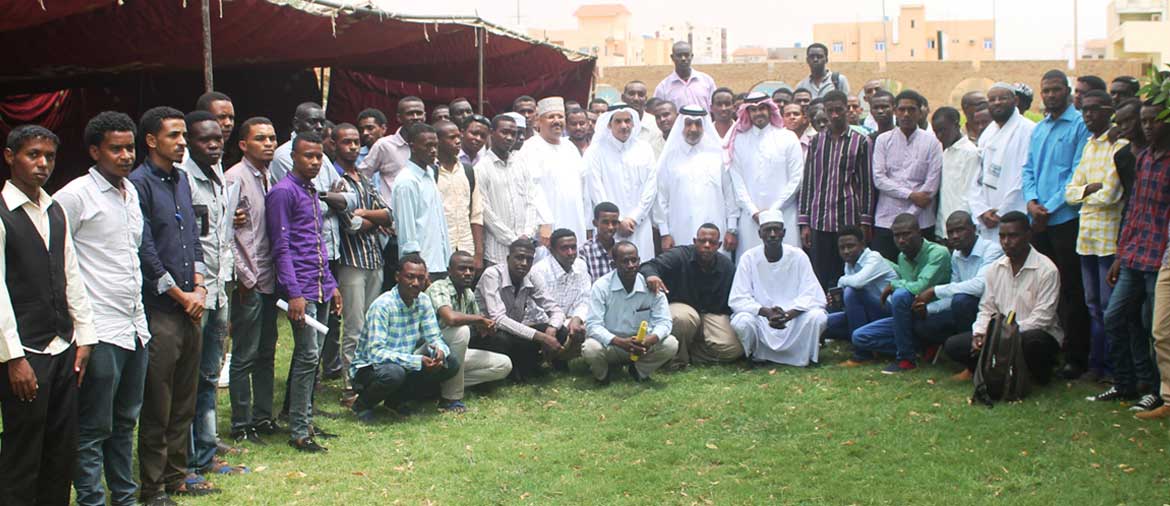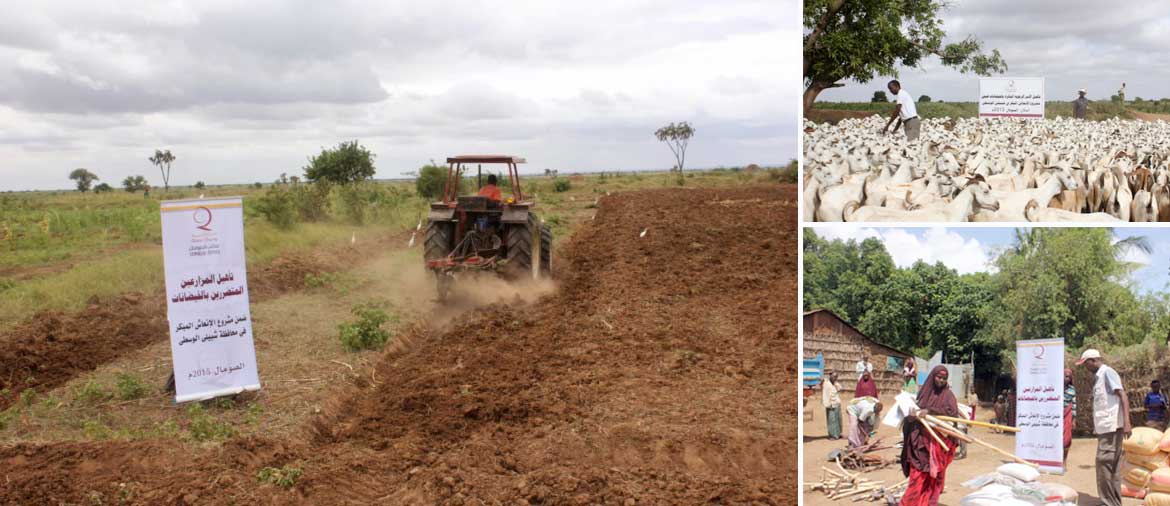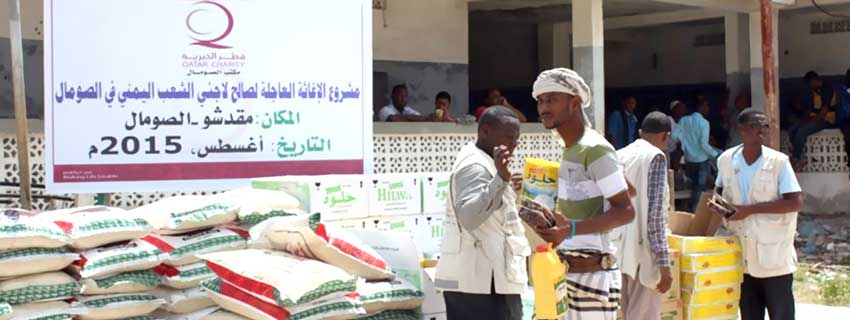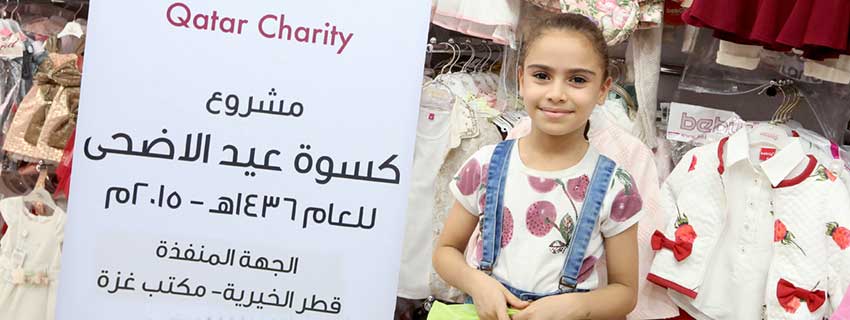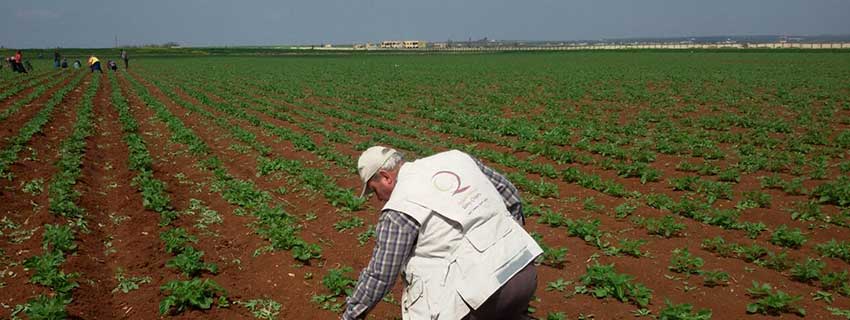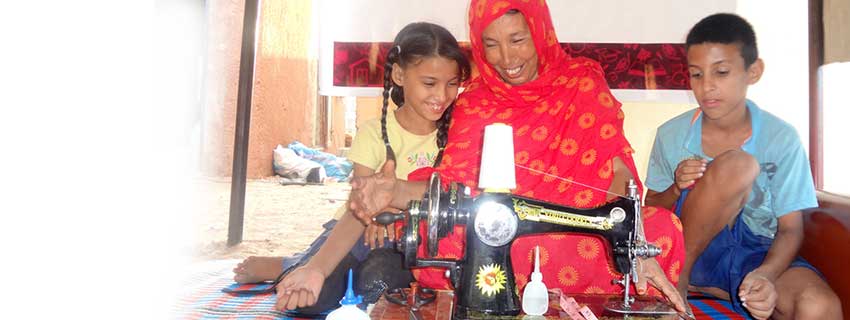The Vice President of Sudan Commends Qatar Charity's Projects
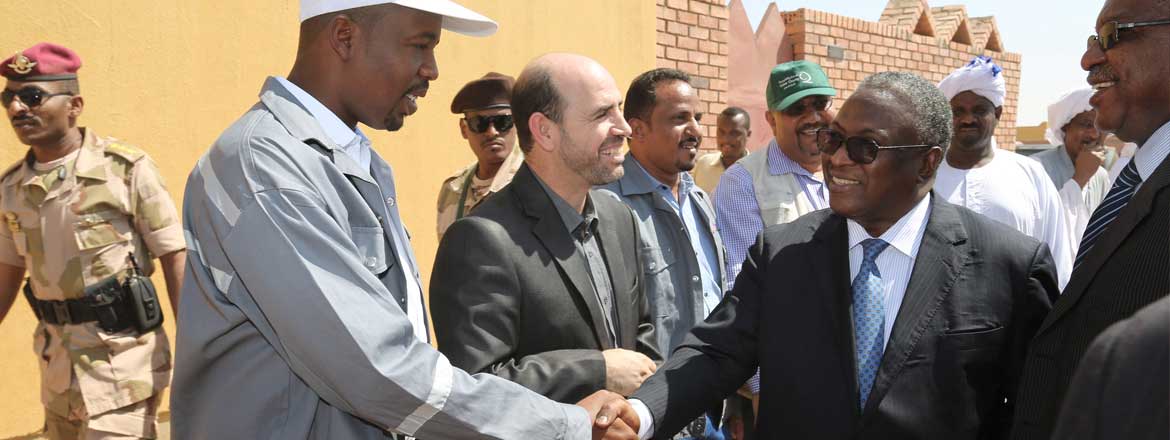
2016-11-20T01:39:28+01:00

The Vice President of Sudan, Hassabo Mohamed Abdel Rahman, appreciated QC's efforts in Sudan, especially the leading humanitarian projects that greatly contributed to the development field. He assured that QC's humanitarian impact in Sudan is noticeable.
A Clear Impact
He believed that QC's projects would continue and expand asserting that the Sudanese government is willing to facilitate the administrative procedures and to overcome the obstacles facing Qatar Charity. He hoped that QC would continue its humanitarian support, which has positively affected the lives of millions of Sudanese since it started its projects in Sudan.
During his visit to the project of ‘Rufakaa’ Model Village, the Vice President of Sudan stressed that this village is a multi-purpose humanitarian project, especially in terms of creating an integrated environment for the targeted orphans' families. This objective can be realized through providing sufficient infrastructure in the education, health and vocational training fields.
A Jump Leap
The Vice President of Sudan praised the strong relations between the State of Qatar and the Republic of Sudan, at both official and non-official levels as well as Qatar Charity's projects that developed various regions in Sudan.
Commenting on the statement of the Vice President of Sudan, Mr. Mohammed bin Ali Al-Ghamdi, the Executive Director of International Development Department at QC said, "QC appreciates the testimony of the Vice President of Sudan related to the impact of its developmental projects demonstrating that QC carries out a brotherly duty." He added that QC seeks to make a major change in the lives of the orphans' families through the project of ‘Rufakaa’ Model Village. 200 families will directly benefit from the project while 5,000 residents of the village's neighboring areas will indirectly take advantage of it. He noted that the project's work is moving forward according to the objectives and the plans developed.
You can donate to support such projects through the link: Click here
Multiple Facilities
Al-Ghamdi explained that the project is implemented on an area of 250,000 square meters in Al Damer municipality, River Nile State. The project includes building 200 houses; each house includes two rooms, a living room, a kitchen, and a bathroom. The project also includes a nursery, a kindergarten, 2 primary schools; one for boys and the other for girls, 2 secondary schools; one for boys and the other for girls. Furthermore, the project provides a vocational training center, a medical clinic, a grand mosque, a mall, and children's playgrounds and green spaces. The village is provided with drinking water, sanitation services, and an administrative office. The project will be completed at the end of the current year.
An Integrated Development Environment
Al-Ghamdi pointed out that this model village is an integrated development environment that develops the characters of the orphans. The village provides different services in the shelter, health, education, and rehabilitation, sports and recreation fields, noting that the village's cost amounts to 32 million QR.
Related News
QC Provides Job Opportunities
Because it always supports the neediest categories and because it always tries to fulfill its duty towards the orphans it sponsors, QC signed a strategic partnership with Hemaya Security Solutions Co. to hire more than 250 orphans of legal age in Sudan. This initiative is considered to be the first of its kind ever to be implemented by a charity organization.
Mr. Rashid Abdurrahman Al-Naimi, Qatar’s Ambassador in Sudan, Mr. Faisal Rashid Al-Fahida, QC’s EDO, and Mr. Falih Hamad Al-Hajri, Chief of Governmental Relations Department at Hemaya, supervised the starting of the interviews.
More than 548 candidates applied for the job. 400 of which were interviewed by Hemaya’s delegate Mr. Falih Ahmed Al-Hajri. The interviews lasted for four consecutive days; then 319 were selected to work for Hemaya. 250 of them were from orphans and 59 of them were from the orphans’ families.
Commendations
Mr. Rashid Abdurrahman Al-Naimi, Qatar’s ambassador in Sudan, praised the cooperation between the Qatari institutions to achieve humanitarian and charitable goals. He said it shows Qatar’s bright side.
Furthermore, Mr. Faisal Rashid Al-Fahida, QC’s EDO, commended the outcome of the partnership between Hemaya Co and QC. Such initiative will result in the enhancement of the conditions of many families.
Mr. Falih Hamad Al-Hajri, Chief of Governmental Relations Department at Hemaya, emphasized on the company’s willingness to expand its partnership and increase the work with QC under the understanding of the responsibilities of the Qatari institutions to make a positive change in people’s lives and to empower them economically.
All of the interviewees expressed their appreciation and gratitude for Qatar and QC for such a good initiative hoping more orphans and poor families would benefit from it.
The EDO said that according to QC’s procedures and regulations, the sponsorship time ends when the orphan becomes of a legal age; 18 and above. However, QC never stops helping them until they are financially independent.
Sponsorship Services
QC offers two kinds of services to the sponsored children. First, it offers individual services such as regularly giving money to the sponsored during the time of sponsorship, and directly supervising the student’s education, health, social behavior and psychology. In addition, it offers in-kind contributions every now and then which help the child such as giving him\her a school bag or Eidya.
Second, it offers a group services which include all the activities QC does for a group of sponsored children at the same time. These services and activities can be cultural, artistic, educational, sport, or entertaining.
Sponsorships differ and depend on the conditions of the orphan. There is the sponsorship of a child living with his family, a child living with a foster family, and a child living in an orphanage. Sponsoring children while living with their families comes first because QC believes in the importance of growing up around one’s family. Family is a healthy environment which supports the child educationally, psychologically, emotionally and socially. Sponsoring children by sending them to foster families comes second. Finally, if the first and second choices are not available, QC sends children to an acknowledged orphanage.
85,000 Orphans
QC is currently sponsoring more than 3,489 orphans in 8 Sudanese states. It provides them with financial and educational support, and offers them cultural and entertaining activities. As part of last year’s campaign “Rofaqa’” (Companions), QC sponsored more than 750 orphans in Sudan. Finally, QC sponsors around 85,000 orphans around the world in more than 40 countries.
QC Implements Tens of Qualitat
- Hundreds of goats were distributed to the people to help them start over.
- Tens of hectares were restored for 250 families whose lands had been flooded.
As part of its early relief program to the victims of floods in the Middle Shebelle governorate in Somalia, QC implemented qualitative income-generating projects from which 400 families of the same governorate benefited.
Rehabilitation:
The projects included rehabilitation of the affected families and improvement of their life quality, in addition to supporting agriculture and shepherding. The program also included funding income-generating projects. For example, 750 goats were distributed to 150 families. Each family received 5 goats. This project was to enable them to get their ordinary lives back after the floods. The project also aimed at supporting shepherding and providing these families with a source of income that matched their previous professions.
QC has also restored agricultural lands in a total area of 250 hectares for 250 families who had worked in farming before the floods damaged their lands.
QC seeks to rehabilitate the agricultural and shepherding societies and start agricultural and shepherding businesses by supplying the workers with seeds and pesticides as well as manual cultivation instruments needed for local production. QC also helps them in their farmland restoration, and irrigation canals’ reformation. The program also supplied them with some cattle.
Terrible Immigration
The regions adjacent to the two rivers of Shebelle and Juba witnessed heavy rains in last October and November which led to the flooding of the rivers and caused a disastrous immigration of the inhabitants of the rivers’ banks. Middle Shebelle was mostly affected as most irrigation canals and flood control systems were damaged along the Shebelle River by these floods. Reports show that about 10,000 of the local inhabitants left their flooded cities, villages, and farms.
The objective QC had of the early relief project was to reach the local affected community in the governorate as it helped rehabilitate them in their crafts and professions. QC’s goal was to enable them to increase their daily income and enhance their life quality through a number of strategic projects including shops, production machinery, animals, and farmland restoration. This should facilitate their future confrontation to yearly floods. This project also seeks to restore artesian aquifers, reform schools and damaged clinics to help 93,000 people living in the region.
Tens of Thousands Beneficiaries
It is worth mentioning that QC has recently implemented various projects in Somalia including education, health, building mosques, and funding income-generating projects. Tens of thousands of Somalis around Somalia benefited from these projects. Of its construction projects in Puntland, QC inaugurated the reformation of 2 health centers and 2 preliminary schools at a cost of about 292,000 QR.
QC inaugurated the opening of 9 mosques, and 8 centers for memorization of Qur’an in 3 provinces in the north of Somalia: 3 mosques in the coastal province, 3 others in Burco, 1 in Awdal, and 2 in Hiran and Banaadir. It also built 8 centers for Qur’an memorization in Hiran, Banaadir, and Hargeisa. Thousands of Somalis shall benefit from these mosques and centers.
QC office in Somalia has also organized events of distributing sewing machines to 65 productive families in Mogadishu and Hargeisa city in Somaliland in cooperation with Jedoon Association for Woman and Child Development in Hargeisa and HINNA association in Mogadishu.
You can donate to support such projects through the link: Click here
QC Implements Relief Projects
- The aids are sufficient for the refugees and returnees for a month
- Members of the Somali Parliament and Representatives of the Yemeni community contributed in the distribution
Through its office in Somalia and as part of its relief campaign “Yemen, We are With You”, QC implemented an urgent relief project which targeted 600 families of the Yemeni refugees in Somalia and some of the Somali returnees from Yemen who are living in Mogadishu, Hargeisa, and Bosaso.
The food baskets, distributed to the beneficiaries, were sufficient for a whole month. Each family received 25 kg of rice, 25 kg of flour, 15 kg of sugar, 3 liters of cooking oil, 2.5 kg of powder milk, and 2 kg of dates.
Prominent Figures
Many prominent figures took part in the distribution of the aids to the people, including some members of the Somali parliament, and the representatives of the Yemeni community in Somalia. They all commended QC’s role in helping the Yemeni and Somali peoples.
This is one of so many other projects in which QC continues to fulfill its role in aiding and helping others. In addition, QC always makes sure that its beneficiaries are the neediest. The Yemeni people are suffering from a dire crisis which forced the families to emigrate and ask for asylum. This, of course, left the families without any living necessities.
Although Somalia is suffering from hard conditions and security issues, it became one of the countries which received the Yemeni refugees. Therefore, it is now the responsibility of those who work in charity and humanitarian fields to strengthen their efforts so that Somalia does not suffer from a critical condition, too.
130,000 Beneficiaries
130,000 beneficiaries benefited from QC’s continuous campaign ‘Yemen, We Are with You’ since the recent Yemen crisis started and until the end of last May (2015).
The food aid included 17,300 food baskets, 80 tons of flour, and 180 tons of different types of food which were distributed to the different governorates. Furthermore, 3 kitchens were prepared and equipped with foodstuff to provide daily fresh meals for 1,000 persons. Regarding healthcare, the hospitals of Aden, Ma’rib, and Taiz were supplied with some equipment, 100 first-aid bags, and a large amount of medications, and medical disposables.
In addition, 8 water tanks were distributed in Aden with the capacity of 1,000 liters. QC also distributed hundreds of mattresses and blankets to the displaced families there. Another project was funded to clean Aden Municipality in cooperation with its workers.
Call for Help
It is worth mentioning that when the Yemeni crisis started, QC appealed for help to provide 1,260,000 conflict-affected people with food, and medications.
After its appeal and as a first step, QC launched its campaign ‘Yemen, We Are with You’ to collect 36,500,000 QR (10,000,000 USD) to urgently deliver these humanitarian aids to the most affected categories.
QC also supervised the distribution of aids which Qatar sent to the people of Yemen. The aids were delivered through an air bridge from Doha to Djibouti–Ambouli International Airport following the instructions of his highness Sheikh Tamim bin Hamad Al Thani, God bless him. The aids were delivered over two days; there were 4 airplanes which carried 240 tons of different materials.
The aids were received by a delegation of QC which included Mr. Ibrahim Ali Abdullah, QC's Relief Department Director, and Mohammed Wa'i, QC's Office Director in Yemen.
QC’s field team was able to aid many conflict-affected families since the crisis first started in Aden and other Yemeni cities. They provided the families with food, drugs, and medical disposables. They sent the medical supplies to the hospitals so that they would treat the injured. The team also provided the families with food baskets and other basic and necessary items.
You can donate to support such projects through the link: Click here
QC Implements ‘Kiswit Eid’ (Ei
- QC focused on the countries suffering from exceptional circumstance such as Palestine, Syria and Yemen
- El Kuwairi, “‘Kiswit Eid’ project aims at making the orphans happy, especially that it’s Eid”.
In 33 different countries, 1,750 orphans enjoyed the Eid and became more hopeful for a better future thanks to Rofaqa initiative, one of QC’s initiatives.
This project is one of so many others which QC works hard to implement so as to bring joy and happiness to the hearts of its sponsored children in Eid Al Adha.
Love & Care
Countries which suffer from exceptional circumstances were focused on such as Palestine, Syria and Yemen. These countries’ orphans need all the love and care one can possibly offer. They suffer every single day that any ray of hope could be very useful to them.
However, QC did not forget about the orphans elsewhere. It’s project was implemented in India, Jordan, Philippine, Bangladesh, Lebanon, Iraq, Pakistan, Sri Lanka, Nepal, Indonesia, the Comoros, Kyrgyzstan, Ethiopia, Nigeria, Mauritania, Kenya, Morocco, Chat, Mali, Benin, Burkina Faso, Senegal, Ghana, Togo, Niger, Bosnia, Albania, Kosovo, Sudan and Tunisia.
‘Eid Clothing’ campaign covered the orphans’ different needs. It included getting them shoes, and presents (based on their age and gender): shirts and pants for the boys, and dresses and shoes for the girls. More than 550 orphans benefited from the project.
Values of Mercy
Mr. Youssif Bin Ahmed Al Kuwairi, QC’s CEO, said, “We, at QC, made sure to prioritize the orphans, and pay extra attention to them. QC does its best to provide them with the necessary care they need. Plus, we all know that the reward our religion promises to those who sponsor orphans is great.”
He, then, added, “‘Eid Clothing’ initiative is only a means to compensate for their loss. Yes, it is not like parental love and care; however, QC works hard to make the orphans feel like they’re a part of something, a family. We know how important it is to stand by these orphans’ side; which is why supporting them is a priority.”
Through its ‘Rofaqa’ initiative, QC inaugurated ‘Eid Clothing’ campaign for the benefit of its sponsored orphans. The number of sponsored orphans from 31st of December 2013 until today reached 39,057 orphans from 35 different countries the world over.
Similar Projects
At the same time QC implemented ‘Eid Clothing’ project, it implemented ‘Your Sacrifice, their Eid’ campaign. Through this campaign, QC was able to provide 28,100 sacrifices (of bulls and sheep) in 54 countries in Asia, Africa, and Europe at a cost of 13,560,000) QR.
As for the Hajj season, QC implemented many projects which included ‘Substitute Hajj’, ‘Feeding Pilgrims’ and ‘Grouping Pilgrims’. Thanks to QC, 1,500 pilgrims performed substitute hajj at a cost of 5,700,000 QR. It also grouped 16 pilgrims at a cost of 152,000 QR and provided 25,000 meals for the pilgrims.
Comprehensive Care:
QC sponsors around 80,000 orphans from 35 countries. It offers them comprehensive care which includes education, health, shelter and other basics.
‘Rofaqa’ Initiative is a unique humanitarian initiative which is interested in helping orphans worldwide. It aims at reaching a complementary level of care for children and orphans. It wishes to offer a new vision based on comprehensive care to include social, educational, health and psychological aspects. ‘Rofaqa’ initiative, which was inaugurated in December 2013, was able to sponsor 39,057 orphans so far.
You can donate to support such projects through the link: Click here
QC Continues to Implement Dist
- 8 hectares of potato were planted and 133 tons of potato were produced from which 320 families of farmers and laborers benefited
- The farmers of Northern Aleppo harvested 133 tons of potato thanks to QC’s ongoing relief aids whose purpose is to compensate for the food shortage inside Syria.
‘Planting Potato’ project was able to contribute in achieving self-sufficiency for the conflict-affected inside Syria. The project provided the basic foodstuffs at good prices and with good quantities specially that the crisis has been going for long. It provided job opportunities for a number of workers in the field of agriculture so as to satisfy their daily needs and their families’. The project also aimed at making use of the landscapes in a good and useful way.
The implementation of this project took 10 months at a cost of 570,000. 8 hectares of potato were planted and 133 tons were produced. It provided jobs for 320 people.
Renting the Land
Since Syria is in desperate need for foodstuffs, QC made it a priority that 34% of its projects were dedicated for this purpose. It is impossible for anyone to live without food, especially the internally displaced Syrians.
‘Potato Planting’ project, implemented by Beyaz Eller (White Hands), is part of the developmental and food projects which aim at compensating for the shortage in foodstuffs from which the people of Syria suffer. It is also implemented to encourage the farmers to go on with farming and to reform arable lands. Fortunately, many people who are originally from this area or have been displaced to it are experienced in the field of agriculture.
Through this project, 8 hectares of enhanced potato were planted. Plus, a contract was signed with the farmers: QC would rent the land from the farmer and sign a cultivation contract with him; or sign a contract with another farmer who has experience in the field; furthermore, QC would secure irrigation water by using rented wells from the same land.
The engineers supervising these projects are experienced and well-acquainted with the environment of the area. Therefore, it is expected that these projects will result in providing wheat and potato at great prices and with good quantities so as to bridge the food gap in Syria.
Redent Control
In order to prevent any plant diseases and to safely grow crops, QC sprayed nitrogen fertilizers and used weed killers. As a result, the corps turned out really good.
Through this project, 50 hectares of enhanced wheat and potato were planted and the procedures of the implementation of the project were the same as the previous one.
Potato is usually planted in the northern countryside in two main seasons: spring (the most important season) from the 10th of February until the 10th of March; taking into consideration the type and the weather during the time of cultivation; and autumn from the 20th of July until the 20th of August. In comparison with autumn, spring produces twice the amount of crops, which means twice the production.
Wheat Cultivation
It is worth mentioning that QC had already implemented an agricultural project for the benefit of the residents of the countryside of Aleppo, Idlib and Al Sahel in Syria. This project led to the investment in 50 hectares for the cultivation of wheat and potato. It was implemented in cooperation with Beyaz Eller at a cost of 900,000 QR.
4,200,000 displaced Syrians and refugees benefited from QC’s projects, which were implemented at a cost of 205,000,000 QR from April 2011 until January 2015.
You can donate to support such projects through the link: Click here
QC Offers Income-Generating Pr
- The projects included distributing sewing machines, and holding preparatory courses in sewing and embroidery.
- Fatima bint Al Naji, “QC’s project helped me secure a fixed income to ensure for myself and my family a dignified life without having to need anyone.”
10 disabled female-breadwinners benefited from the income-generating project implemented by QC in Mauritania. It included distributing sewing machines and holding preparatory courses on sewing and embroidery.
QC aims at fighting poverty, especially that among the disabled persons and the breadwinners. This project seeks to provide a fixed income to the beneficiaries through their use of the sewing machines, which were given to them after good training.
The disabilities of the benefiting female-breadwinners varied; some of them were handicapped, and others suffered from partial paralysis.
Many Benefits
The sewing machines were delivered to the disabled women during the honoring ceremony organized by QC in cooperation with Mauritanian Association for Assisting the Handicapped, the partner responsible for the project’s implementation.
Some of the figures who attended this ceremony are: the head of the Handicapped Persons department in the Ministry of Social Affairs, the mayor assistant of Arafat Municipality in Nouakchott, the head of the Mauritanian Association for Assisting the Handicapped, and QC’s director of Social Care department in QC’s office in Mauritania.
Mr. Ahmed wild Wihda, Mayor Assistant, expressed his sincere gratitude for the parties which funded and implemented this project. He also expressed his hope for future similar projects so that more people would benefit from them.
Mr. Jamal wild Abdel Jaleel, Head of the Mauritanian Association for Assisting the Handicapped, said, “This kind of projects funded by QC is very important and essential. It has many benefits: it helps fighting poverty, supporting the disabled, and assisting the breadwinners. Such categories need our help and care.”
The Beneficiaries’ Commendations
After the ceremony was over, the officials distributed the sewing machines to the beneficiaries who expressed their deep joy and happiness. They said that the project was superb because it offered them training and sewing machines and that they now had jobs that could help them bring in a fixed income. This way, they said, they could ensure a dignified life for themselves and their families.
Ms. Fatima bin Al Naji, one of the beneficiaries, said, “I cannot express the amount of happiness I am feeling right now. I thank QC and its local partners and the beneficiaries who funded this project. I hope that this is the beginning of something good. Now that I am done with the training and I got a sewing machine, I think I will now embrace life happily.”
Ms. Adada bint Al Sofi said that she felt ready to start working on the sewing machine she received. She also thanked all the philanthropists who helped fund and implement this important project.
Conventional Bakeries
QC had recently implemented a group of income-generating projects in different cities and villages in Brakna, Mauritania. The projects included 8 conventional bakeries from which around 7,000 people benefited.
The bakeries have rooms for bread and dough. The most appropriate kind of ovens to equip these bakeries with was brick ovens because these areas, where the project was implemented, don’t have electricity and because bricks are found excessively and at great prices. Some of the beneficiaries would even get the bricks themselves. As for the construction of the bakeries, they were built according to modern technologies so that they would not suffer from the problems brick bakeries generally face.
The bakeries were built in several cities and villages in Brakna such as Magta-Lahjar, Sangrafaa, Tachott, Taiba, Al Hoda, and Dutti (which is very far, almost isolated).
These bakeries left great impact on the villagers who could now buy bread at cheap prices and at the quantities they desire. Bread, of course, is essential to most of the villagers – it is part of their food.
You can donate to support such projects through the link: Click here
